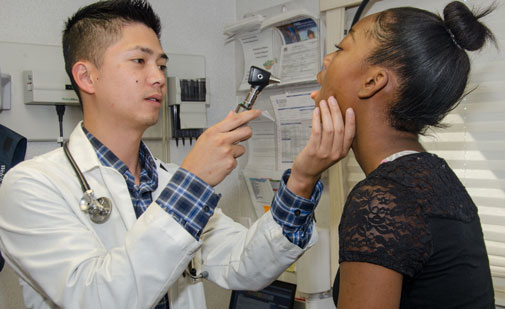
Regular checkups It’s important for you to get regular checkups when you’re pregnant. Seeing the doctor regularly can help keep you and your baby healthy. If you have any problems, the doctor may notice them. And when you follow your doctor’s advice, you may prevent problems during delivery.
How often? See your doctor:
• once each month from the 4th week of your pregnancy through the 27th week.
• twice a month from the 28th week through the 35th week.
• once each week from the 36th week until the baby is born.
Your first doctor’s visit At your first visit your doctor will
• perform a full physical exam
• take your blood for lab tests
• and figure out your due date
Your doctor might also
• do a breast exam
• do a pelvic exam to check your uterus (womb)
• and do a cervical exam, including a Pap test
Questions During this first visit, your doctor will ask you lots of questions about your lifestyle, relationships, and health habits. It’s important to be honest with your doctor.
At most of your doctor’s visits At most of your prenatal visits, your doctor will:
• check your blood pressure and weight
• check the baby’s heart rate
• measure your belly to check your baby’s growth
Tests You also will be given some tests that every pregnant woman receives. Some of these are
• tests to look for anemia
• tests to measure your risk of gestational diabetes. This is a type of diabetes that can begin during pregnancy.
• tests to look for harmful infections
You and your doctor Become a partner with your doctor!
• Keep all of your appointments. Every doctor’s appointment is important!
• Think about questions to ask your doctor and write them down before your visits.
• Read to learn more about pregnancy, birth, babies and breastfeeding.
• And if your doctor tells you to get your shots, get them! Read more about shots here>>
Risk of complications? Pregnancies with a greater chance of complications are called “high-risk.”
Don’t be scared! Some women with high-risk pregnancies never have any problems at all.
But if you have a high-risk pregnancy, you need to see your doctor more often.
Greater risk You may be at a greater risk of problems during pregnancy:
• if you are very young or older than 35
• if you are overweight or underweight
• if you had problems in a previous pregnancy
• if you had certain health conditions before you became pregnant, such as high blood pressure, diabetes, cancer or HIV
• if you were pregnant with twins during an earlier pregnancy
Also at greater risk You also may be at greater risk if you begin to have health problems during your pregnancy. Some common health problems are gestational diabetes and preeclampsia. Gestational diabetes is a type of diabetes that can occur during pregnancy. Preeclampsia is a combination of high blood pressure and other health problems.
Talk to your doctor! Is your pregnancy considered a high-risk pregnancy? If so, you may worry about your unborn baby’s health and have trouble enjoying your pregnancy. Talk to your doctor about your concerns. Your doctor can explain your risks and the chances of a real problem.
Listen to your doctor! Follow your doctor’s advice. For example, if your doctor tells you to take it easy, then ask your partner, family members, and friends to help you out in the months ahead.
Are you on WIC? If you are a WIC participant, your WIC educator will talk to you about your doctor’s visits. And if you have a high-risk pregnancy, you will be referred to one of our nutritionists. They specialize in counseling pregnant women and parents about a variety of health problems.


